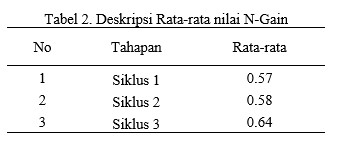Peningkatan Keterampilan Berpikir Tingkat Tinggi (Higher Order Thinking Skills) Peserta Didik Menggunakan Modul Pembelajaran Fisika Yang Berbasis Pendekatan Saintifik Materi Suhu Dan Perubahannya
DOI:
https://doi.org/10.31957/jfp.v2i1.24Keywords:
temperature, scientific approachesAbstract
The purpose of this study is to find out the increase in the HOTS of students using learning modules based on a scientific approach to the material of temperature and its changes. The sample taken in this study was 34 students of grade 7 MTs. Jayapura City State. This study uses a classroom action research method that uses 3 cycles to determine the increase in HOTS. The results showed that in learning using the module, students' HOTS increased with the n-Gain value of the cycle (1) of 0.57, (2) of 0.58, and (3) of 0.64 with an average n-Gain value. of 0.60 medium categories. Based on this, it can be concluded that students have sufficient higher-order thinking skills (HOTS).
References
Boa, E. A., Wattanatorn, A., & Tagong, K. (2018). The development and validation of the Blended Socratic Method of Teaching (BSMT): An instructional model to enhance the critical thinking skills of undergraduate business students. Kasetsart Journal of Social Sciences, 39(1), 81–89. https://doi.org/10.1016/j.kjss.2018.01.001
Bray, A., Byrne, P., & O’Kelly, M. (2020). A Short Instrument for Measuring Students’ Confidence with ‘Key Skills’’ (SICKS): Development, Validation, and Initial Results.’ Thinking Skills and Creativity, 37(July), 100700. https://doi.org/10.1016/j.tsc.2020.100700
Budiarti, I. S. (2021). Pengembangan petunjuk praktikum fisika materi viskositas berbahan lokal metroxylon sagu. 2(1).
Daryanto (2013). “Menyusun Modul bahan ajar untuk persiapan guru dalam mengajar”. Yogyakarta : Gava Media, cetakan ke - 1.
Depdiknas, (2003), “Undang-undang RI Nomor 20 Tahun 2003, tentang Sistem Pendidikan Nasiona”l. Jakarta : Biro Hukum Sekjen Depdiknas, cet. I.
Indra (2017) : “SOLATIF (Solusi Siswa Aktif) IPA Terpadu untk SMP/Mts Kelas VII”. Sidoarjo : Masmedia Buana Pustaka
Jarvis, M. A., & Baloyi, O. B. (2020). Scaffolding in reflective journaling: A means to develop higher-order thinking skills in undergraduate learners. International Journal of Africa Nursing Sciences, 12(December 2019), 100195. https://doi.org/10.1016/j.ijans.2020.100195
Kwangmuang, P., Jarutkamolpong, S., Sangboonraung, W., & Daungtod, S. (2021). The development of learning innovation to enhance higher-order thinking skills for students in Thailand junior high schools. Heliyon, 7(6), e07309. https://doi.org/10.1016/j.heliyon.2021.e07309
Lestari, S., Siregar, T., & Nainggolan, J. (2019). Pengembangan Modul IPA Terpadu Berbasis Kearifan Lokal Papua Materi Interaksi Mahluk Hidup Terhadap Lingkungan. Jurnal Ilmu Pendidikan Indonesia, 7(3), 106–112. http://ejournal.uncen.ac.id/index.php/JIPI
Marthen Kanginan (2016), “Fisika untuk SMA/MA kelas X Kurikulum 2013 Revisi”. Cimahi : Penerbit Erlangga
Negeri, S. M. A., Bengkulu, K., Wati, K., Medriati, R., Purwanto, A., Fisika, J. P., & Bengkulu, U. (2015). Penerapan pendekatan saintifik melalui model. 01(01), 29–32.
Ortega-Morán, J. F., Pagador, B., Maestre-Antequera, J., Arco, A., Monteiro, F., & Sánchez-Margallo, F. M. (2020). Validation of the online theoretical module of a minimally invasive surgery blended learning course for nurses: A quantitative research study. Nurse Education Today, 89(May 2019), 104406. https://doi.org/10.1016/j.nedt.2020.104406
Permatasari, P. A., & Dwiastuti, S. (2016). Pengaruh Penggunaan Modul Berbasis Guided Inquiry terhadap Peningkatan Motivasi Belajar dan Kemampuan Berpikir Kritis Siswa The Effect of Guided Inquiry Based Learning Module Using on Improvement of Learning Motivation and Critical Thinking Skills. Proceeding Biology Education Conference, 13(1), 318–324.
Ridwan A.S. (2016). “Inovasi Pembelajaran”. Jakarta : Bumi Aksara, cetakan ke - 4.
Ridwan A.S. (2017). “Pembelajaran Saintifik untuk Implementasi Kurikulum 2013”. Jakarta : Bumi Aksara, cetakan ke - 4.
Sakliressy, M. T., & Panda, F. M. (2021). PEMBELAJARAN FISIKA MENGGUNAKAN MODEL PROBLEM BASED LEARNING ( PBL ) DAN KOOPERATIF TIPE STUDENT TEAMS ACHIEVEMENT DIVISION ( STAD ). 2(1), 10–17.
Saragih, E. A. (2016). Jurnal ilmu pendidikan indonesia 1. Jurnal Ilmu Pendidikan Indonesia, 4(1), 16–23.
Studi, P., Fisika, P., Pendidikan, J., Pengetahuan, I., Ilmu, F., Dan, T., Islam, U., & Syarif, N. (2019). Pengaruh Modul Digital Terhadap Keterampilan Berpikir Tingkat Tinggi (Hots) Siswa Pada Materi Karakteristik.
Sugiyono (2017), “Metode Penelitian dan Pengembangan, Research and development”. Bandung : Alfabeta, Cetakan ke – 3.
Sugiyono (2017). “ Statistika untuk Penelitian”. Bandung : Alfabeta, Cetakan ke – 29.
Sugiyono (2018). “ Metode Penelitian Pendidikan : Pendekatan Kuantitatif,Kualitatif, dan R&D”. Bandung : Alfabeta, cetakan ke – 27.
Sunardi dan Irawan E. I. (2011). “Fisika Bilingual SMA/MA, Untuk SMA/MA Kelas X”. Bandung: CV. YRAMA WIDYA, cetakan ke – 17
Wijnen, F., Walma van der Molen, J., & Voogt, J. (2021). Measuring primary school teachers’ attitudes towards stimulating higher-order thinking (SHOT) in students: Development and validation of the SHOT questionnaire. Thinking Skills and Creativity, 42(May), 100954. https://doi.org/10.1016/j.tsc.2021.100954
Yildiz, C., & Guler Yildiz, T. (2021). Exploring the relationship between creative thinking and scientific process skills of preschool children. Thinking Skills and Creativity, 39(January), 100795. https://doi.org/10.1016/j.tsc.2021.100795
Zhang, J., Sun, Y., Gao, Y., & Fang, X. (2019). Event-centric Machine Strategic Reading Approach for Scientific Literature. Procedia Computer Science, 147, 44–48. https://doi.org/10.1016/j.procs.2019.01.182
Zhankaziev, S., Gavrilyuk, M., Morozov, D., & Zabudsky, A. (2018). Scientific and methodological approaches to the development of a feasibility study for intelligent transportation systems. Transportation Research Procedia, 36, 841–847. https://doi.org/10.1016/j.trpro.2018.12.068

Downloads
Published
Issue
Section
License
Copyright (c) 2023 This license allows reusers to distribute, remix, adapt, and build upon the material in any medium or format, so long as attribution is given to the creator.

This work is licensed under a Creative Commons Attribution-ShareAlike 4.0 International License.




